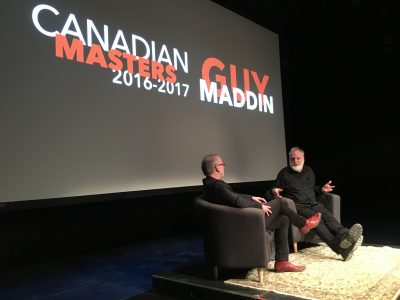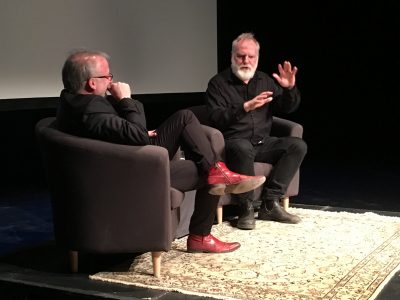For the third and final Canadian Masters celebration of the 2016-2017 season, Carleton University’s Film Studies department and the Canadian Film Institute (CFI) welcomed acclaimed filmmaker Guy Maddin to Ottawa from March 30 to April 1.
Maddin’s films are unique and push the medium forward, their strangeness and absurdity confounding and captivating audiences since his debut short film, The Dead Father, in 1985.
Tom McSorley, CFI’s president and a professor at Carleton, introduced Maddin somewhat differently on the evening of March 30 at the Arts Court Theatre, offering up a Maddin-esque history of the filmmaker as getting his start in the late 1890s and always regretting that he never punched John Grierson, founder of the National Film Board.
“Not all of this is real, but all of it is true,” McSorley said, accurately capturing the introduction and Maddin’s film oeuvre all at once.
What followed was a career-spanning clip series of Maddin’s films, both features and shorts. The interview between McSorley and Maddin also covered the decades of Maddin’s career, starting with his punk music-inspired amateur beginnings and ending with deeply personal tragicomic anecdotes about his family.
The events wrapped up the Canadian Masters inaugural series of conversations, co-presented by CFI in collaboration with Carleton University’s Film Studies department, which is currently celebrating its 40th anniversary. Following Atom Egoyan and Alanis Obomsawin, Maddin’s work offered a salient conclusion that blurs fact and fiction.
Maddin described his long-standing attempt to create a hybrid of joy and sadness in his films, while acknowledging their reception. “I don’t want to be accused of having a wanking, artsy-fartsy aesthetic…which I have been many times,” he said. He was regularly self-deprecating throughout the event, but remained insightful and hilarious.
Maddin is now a Visiting Lecturer on Visual and Environmental Studies at Harvard University, highlighting a common thread in the discussion about how little money he makes from his films. He explained, “Because I’ve boasted about coming in under-budget, I’ve been stuck with less and less money!”
He maintained that it’s an exciting time to be a filmmaker. Maddin was gracious enough to sit down with Carleton students Friday evening on campus for a more intimate Q&A session, as students picked his brain about his films and his experiences. He expressed an optimistic view of how many opportunities and resources there are for young filmmakers to create and find an audience.
Finally, on Saturday at the Richcraft Hall Theatre, Maddin second feature, Archangel (1990), was screened. Deploying elements of early and part-talkie cinema, the Bolshevik Revolution-centred film is emblematic of Maddin’s persona, recalling the family anecdotes he shared Thursday evening.
He described a story he had been told about a great-grandparent being buried during a flood and the grandchildren jumping on the casket to get it to stay down, followed by the startling image of Maddin as a child opening birthday presents at his young brother’s funeral after he committed suicide. Just like his films, it is to Maddin’s credit that these stories were met with both sadness and humour in the room.
“I know I’m no good,” he said. “But I have something I want to say.”

